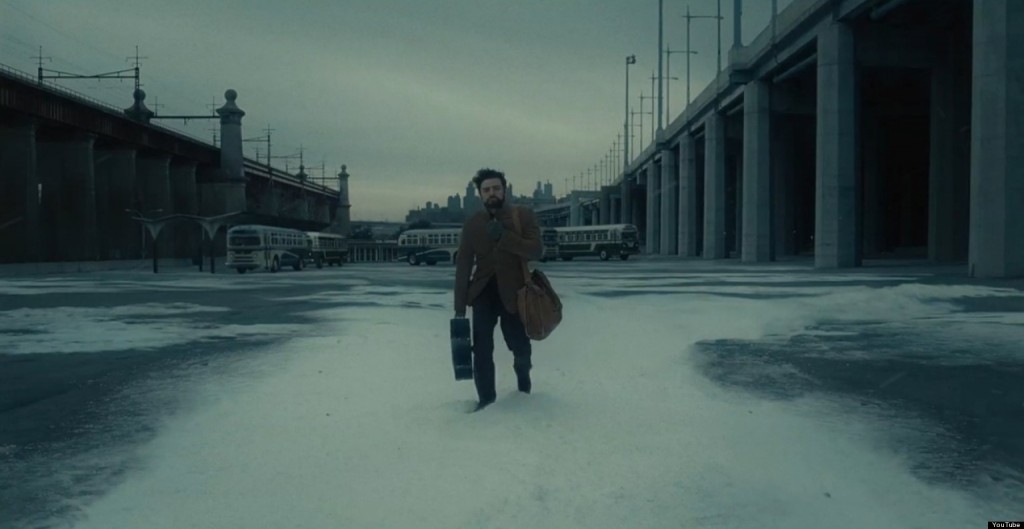Coen Bros: Inside Llewyn Davis part 10
Llewyn, newly discarded from the world of show business, trudges back to New York in this cold, cold American winter.He hitches a ride with a guy going east, driving so the guy can sleep. The guy, who seems to be a regular working-class guy, one of the millions who, in Llewyn’s mind, merely “exist,” trusts Llewyn to handle the situation. Which, in its way, is the saddest joke of the movie.
In the night, on the lonely, bleary American highway, Llewyn first spies a road sign leading to Akron, where his Queen Jane still lives, with his unknown baby. And even though Llewyn has, literally, been given the verdict of death by the Great Man Bud Grossman, he doesn’t take the turnoff and seek to start a new life as a family man. No, he continues back to New York, avoiding responsibility to the last. How much is he avoiding responsibility? Later in the night, dozing at the wheel, the exhausted Llewyn strikes a cat on the road, and leaves without troubling to make sure it’s okay. It may, or may not, be the same cat that he left in the car with the sleeping Roland (it doesn’t look like the same cat, but that’s kind of beside the point at this juncture) but, when choosing between his sleeping passenger and the injured cat, he decides to honor his contract with his passenger and pushes on into the night. Does that represent a step up for Llewyn, morally speaking, or a step down? Or, if “Llewyn is the cat,” has he just struck himself a death-blow, and decided to leave himself limping on the side of the road, the way he’s left so many others?
(For what it’s worth, when Llewyn passes by Akron, the car radio is playing a jazzy rendition of “Old McDonald.” When he strikes the cat, it’s opera. The first is snappy but vulgar, the latter sublime. Does Llewyn consider family life the equivalent of a dressed-up version of a children’s song, but the abandonment of a wounded cat a moment of ironic bliss? That is, is abandoning his responsibilities, even to his own self, an act of low comedy or high drama?)
Llewyn next awakens in his sister’s house. He leaves without a word of goodbye and heads to the local merchant marines office, looking for work. It seems he’s given up, for the moment at least, his artistic ambitions. Unfortunately, he’s behind on his seaman’s dues. “You haven’t paid your dues,” says the administrator, not knowing the half of it.
Llewyn pays up, grumbling “I’m leaving naked, clean start,” as though perhaps the merchant marines represents a kind of grubby new birth, or perhaps a new death, and, before he leaves, goes to visit his father in the old-folks’ home. His father, it seems, is something of a legend in the merchant marines. Everyone speaks highly of him, and there’s a trophy case full of memorabilia about him at the old-folks’ home. Although the place is gray and grim, it seems as though Llewyn’s father was able to make a name for himself and garner the admiration of his peers, which is more than Llewyn can claim now.
Llewyn’s unable to talk to his father, and his father seems unable to listen; either deafness or dementia has claimed him. So Llewyn, for the fourth time in the movie, takes out his guitar to do the speaking for him. This time, he uses it as a kind of plea to connect to his past. He sings “Shoals of Herring,” the song he recorded when he was eight, the song which, back in Act I, he was eager to get rid of. The song is about a life at sea, and a continuum, the old and the young, the yearning to live away from society and become part of a tradition, and it moves Llewyn’s father, but not in the way he’s intending. Rather, it moves only his bowels, and Llewyn has to fetch an attendant to clean up — Llewyn’s music has, literally, moved the shit out of his father.
He goes back to his sister’s house to fetch the papers he needs to sign on to the ship, but that ship, as they say, has sailed — the papers he needs are the same ones he asked his sister to put out by the curb a few days before. In his rush to discard his past, he’s discarded his future.

“When he strikes the cat, it’s opera”
Not opera, actually, but the final movement from Gustav Mahler’s Symphony #4, which has as its text a child’s view of heaven. So perhaps this is a further reference to the child which may be his which is about to be aborted?
Interesting choices of music in this film. The early scene when Llewyn wakes in the Gorfsein’s apartment, the Lacrimosa from Mozart’s Requiem is playing. When he wakes later in the movie in a nearly identical scene there, I think one of Llewyn’s songs was playing, but I can’t remember which one.
Ah oui, en effet, ce court-metrage est un veritable chef-d oevure. Quelle delicatesse, quelle originalite, quelle puissance Et tant de questions importantes sont abordees, et si subtilement! La question kurde (le film est turc!), le rapport entre homme et animal (le lapin!), la difference culturelle (le chapeau du cowboy!) La seule facon de faire un meilleur film est de poser une camera par terre et de filmer les chaussures des passants pendant 24 heures. Seul un tel film pourrait depasser en delicieux et sublime le court-metrage des freres Coen que la tres talentueuse critique du Monde (ah!), et des Cahiers du Cinema (oh!) nous propose avec tant d esprit d a-propos. Tiens, ca me rappelle, il faut que je me reabonne aux Cahiers du Cinema, je n ai plus assez de papier-cul.